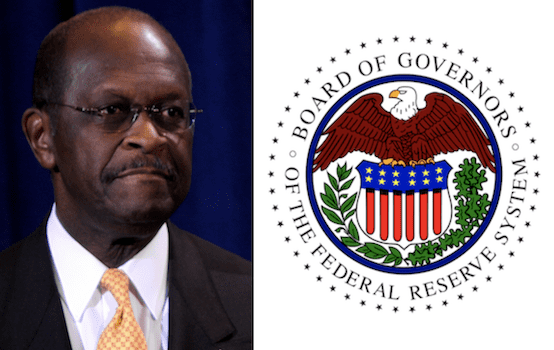Trump is Right to Blow Up the Fed

Last week, President Donald Trump set the economics community aflame by suggesting that he will appoint businessman and presidential aspirant Herman Cain to the Federal Reserve Board. Even more than political economist Stephen Moore, the critics maintain, Cain represents a threat to the cabal that has controlled the central bank for decades.
Why? Because Cain is a successful executive who founded a real business, took risks, and created jobs, things most academic economists will never ever do.
Media outlets and other allied constituencies have howled with rage at the prospect of President Trump “packing the Fed,” a distant reference to attempts by President Franklin D. Roosevelt to pack the Supreme Court in the 1930s. Those worried about the independence of the Federal Reserve Board should reconsider. Independence from what exactly?
While the Fed is meant to be independent from the executive branch on a day-to-day basis, it is certainly not independent of Congress or the law. Yet the Fed in recent years has shown a troubling tendency to deviate from its legal mandate and make up new authorities to fit the changing economic situation. Case in point: the dubious notion that we should seek a 2 percent rate of inflation.
Anybody who cares to read the 1978 Humphrey Hawkins law will know that the Fed is directed by Congress to seek full employment and then zero inflation. Not 2 percent, but zero. Yet going back a decade and more, the Fed, led by luminaries such as Janet Yellen and Ben Bernanke, has advanced a policy of actively embracing inflation. And neither Bernanke nor Yellen bothered to consult Congress when they decided to discard their legal responsibilities.
Quantitative easing, to take another example, represents a vast inflation of the financial markets and housing, yet Fed officials actually appear in public and talk about the conundrum presented by “low inflation.” The inflation in home prices that occurred during and after the Fed’s purchase of trillions in securities has permanently raised the price of housing in many parts of the country, preventing millions from purchasing homes. Yellen confesses to be “perplexed” by the dearth of home purchases by young families, but she is the cause of the malady.
Not only are these pro-inflation policies in violation of the letter of the Humphrey Hawkins law, but they have contributed to increased volatility in the financial markets. The third and frequently forgotten mandate in the Humphrey Hawkins law commands the Fed to employ policies that will produce “stable interest rates.” But the economists have long since stopped talking about this.
The basic problem with the Fed today is that it has gradually fashioned a new set of rules for itself, particularly since 2008, on which Congress has never been consulted. In the same way that economists use their imaginations to concoct new theories about economic behavior, the Fed board has apparently decided to take up legislative powers as well. Is the Fed meant to be free of any real-world restraint on its actions?
As Alex Pollock of the R Street Institute writes in American Banker:
One may wonder whether Fed independence is a technical or a political question. It is political. The nature and behavior of money is always political, no matter how much technical effort at measuring and modeling economic factors there may be. For example, the Fed over the last decade systematically took money away from savers and gave it to leveraged speculators by enforcing negative real interest rates. Taking money from some people to give it to others is a political act. That is why the Fed, like every other part of the government, should exist in a network of checks and balances and accountability.
The biggest problem facing the financial markets today is that the folks at the Fed have no appreciation for how their policies are affecting the real economy. Ten years of inflation, open market manipulation, and other experiments have left the U.S. burdened with trillions of dollars in new public and private debt. The December market break was a direct result of the fact that Fed officials do not really understand the real-world consequences of their actions.
Take another example: U.S. financial institutions are facing years of lower profits as funding costs for banks normalize thanks to Fed manipulation. Yet asset returns for banks and investors will remain suppressed by “extraordinary” monetary policy. Are these massive distortions in the financial markets authorized by Congress? No they are not. When investors in bank stocks have to watch the net interest income for the industry contract, one wonders what our friends on the Federal Reserve Board will say.
Moreover, the Fed’s decision to use excess reserves and repurchase agreements to manage short-term interest rates amounts to the nationalization of heretofore private markets. Is this authorized by Congress? No it is not. Instead the Fed is extending its government-sponsored monopoly over the short-term money markets with little regard for the rights of private investors and financial institutions.
We should be worried about Fed independence, but not because the central bank is somehow suffering under the tyranny of the executive branch. Rather the Federal Reserve is out of control, acting in ways and with powers that were never granted to it. Quantitative easing, “Operation Twist,” and the explicit 2 percent inflation target are just three example of how the Federal Reserve Board is operating outside of its legal authority.
It’s high time that President Trump put some new faces at the Fed and started asking questions about what policies it follows and why.
Christopher Whalen is an investment banker and chairman of Whalen Global Advisors LLC. He is the author of three books, including Ford Men: From Inspiration to Enterprise (2017) and Inflated: How Money and Debt Built the American Dream (2010). He edits The Institutional Risk Analyst, and appears regularly on such media outlets as CNBC, Bloomberg, Fox News, and Business News Network. Follow him on Twitter @rcwhalen.